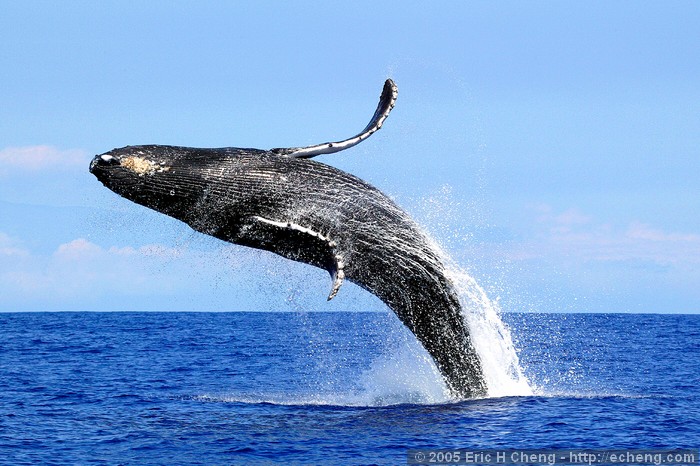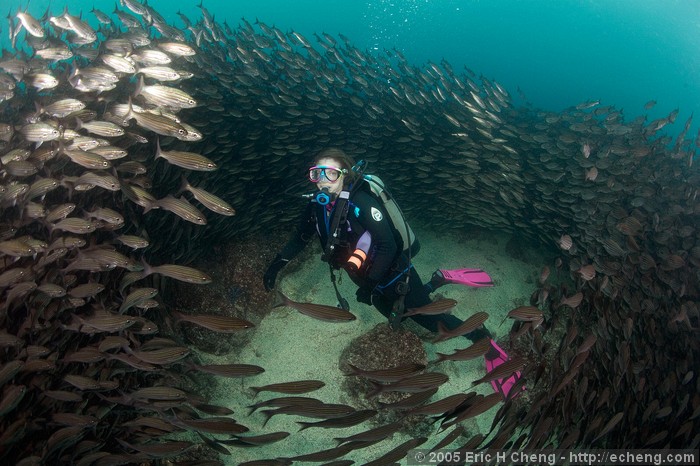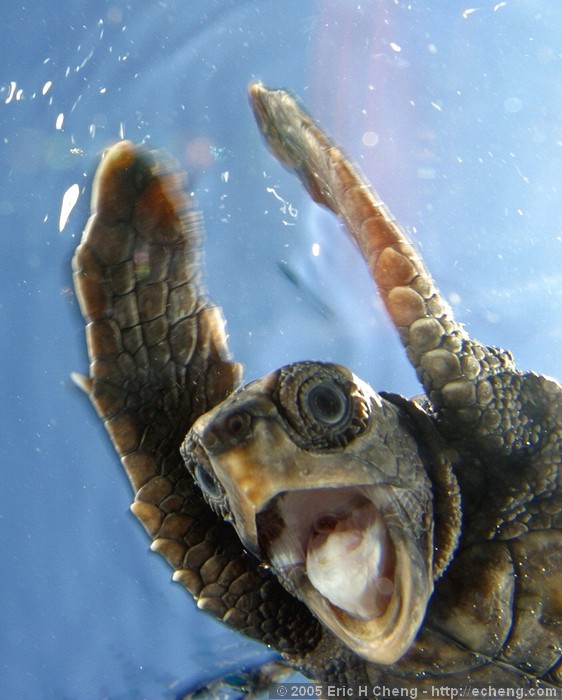




 |
 |
 |
 |
 |
We are trying to develop a community where photographers can come and discuss nature, wildlife and pet photography related matters. We encourage you to enter the forums to discuss this interview as well as to share your photographs and experiences in our forums here at NWP.
This article is Copyright 2005, James Morrissey, and may not, in part or in whole, be reproduced in any electronic or printed medium without prior permission from the author. The images in this article are the property of Eric Cheng and have been licensed to James Morrissey and the NWP Photo Forum for the purpose of this interview.
Part I: About Eric Cheng
 |
(c) Eric Cheng
Editor's Note: A link is at the end of the page if you wish to learn more about Eric and Wet Pixel.
JM: Would you be willing to tell us a little about yourself?
EC: Of course!
JM: Can you tell us a little about what life was like when you were growing up?
EC: I was born in 1975 in Madison, Wisconsin, to Taiwanese immigrants who came to America for graduate school. Two years later, we moved to San Diego, California, where I spent my childhood. I have one sister. I was pushed hard when I was a kid, and spent my time outside of school playing classical music, sitting in front of the computer, and lighting things on fire.
I moved to the San Francisco Bay Area for college, where I pursued undergraduate and graduate degrees in computer science. During school, I spent an equal amount of time pursuing music as I did computer science. In fact, most of the time I felt more at home in the music department than I did on a computer in some dingy basement.
JM: Do you have a family of your own?
EC: Not at the moment.
I am really close to my sister, and have some friends whom I basically consider to be my local family. At an age where most of my friends are just starting families, I'm (unfortunately) about as far away from marriage as I can imagine!
JM: When and how did you first begin to photograph?
EC: I remember being interested in photography during junior high and high school, but for some reason I never took it seriously.
When I left home for college, I took with me my father's old 35mm Pentax SLR, which I had rescued from the depths of a storage closet. I carried it around with me obsessively and constantly took snapshots of the people around me.
In 1998 (during graduate school), I borrowed a 0.5 megapixel digital camera from Stanford University. The thing used floppy disks for storage, and the images it captured were noisy and barely adequate for web use! Even so, using it changed my life. I saved up $1,000, bought my own digital camera, and continued to informally document the people and things around me. During this time, I experimented with digital infrared photography, and in general was fascinated by the things my digital camera could capture that traditional film could not.
I also used to keep salt-water reef aquariums, and through them developed a love for the ocean. On a whim, I took a camera underwater during a trip to Palau in April, 2001, which put me on a path toward photography that I could not have dreamed of.
JM: What is your photographic education?
EC: I am 100% self-taught.
I tried to get into photography courses during college, but the classes were so over-subscribed that students outside of the art department were only admitted via a lottery system (I lost).
I've always had a knack for figuring out how things work, so the technical aspects of photography have never been a problem. I knew my film cameras very well, and given my background, the migration of photography to digital only made things easier.
The less tangible, subjective aspects of photography -- composition, lighting, mood, etc. -- are harder things for me to talk about. I am very much an intuitive shooter and tend not to think very much when I shoot. I only know that a frame is pleasing -- or not -- and while the reasons can usually be accounted for by well-known photographic principles, it is rarely the case with me that I am driven by the principles themselves.
Equally important to being educated in photographic technique and philosophy is being educated about the subjects that one shoots. Most of my subjects these days are wild marine animals, and most of the work in getting photos of such animals involves figuring out how to get close to them.
 |
(c) Eric Cheng
JM: Where does your knowledge of marine life come from?
EC: About the time I started scuba diving, I started maintaining a reef aquarium. Part of keeping marine animals involves learning about their behavior -- and, how to keep them alive. But the vast majority of my knowledge of marine life comes from experience in the water. Nature photography goes hand-in-hand with behavioral biology, and it's hard to do one without studying the other. I also learn a lot from talking with friends in the industry and from the associated follow-up work that happens when figuring out what you have just photographed. I spend a lot of time with my nose buried in critter ID and behavior books.
JM: How long have you been in business?
EC: I've been shooting professionally as an underwater photographer for somewhere between two and three years, although I started to be published seven years ago for work with digital infrared photography.
JM: What made you feel that you could take this professionally?
EC: I'm not sure, actually. So far, the transition into professional photography has been one full of decisions, and I still feel like I'm trying to answer this question for myself.
JM: Is Photography a first profession for you, or have you done other things as well?
EC: My first profession was in the software industry. I got out of graduate school during the middle of the technology boom, and immediately went to work for a small startup company in Silicon Valley, which was really exciting. Unfortunately, it was all-consuming and a bit too narrow of a life for me, so I resigned in 2001 with no idea where I would go next.
I still occasionally take short contracting jobs to keep my software skills sharp, but I'm also noticing that photography is in the progress of a complete transition to digital technology. Because of this, I find that I often end up being as much of a technology guy as I am a photographer.
I also dabble as a classical cellist, which still battles with photography as my primary passion. It's not easy to practice the cello when you're gone half the year.
JM: If photography is not a 'first' profession, how did you decide to enter the door and become a professional photographer?
EC: I sometimes tell people that photography chose me, instead of the other way around.
When I left my job, I had plans to take a break and travel the world for a bit before figuring out what to do next, so I bought an underwater housing and strobe for my little digital camera and went scuba diving in Palau. When I returned home, I uploaded all of the photos onto my website in the form of a travel journal, and went about my normal life.
But during the trip, I met the owner of a dive resort in Bora Bora, who later invited me to create a website for his resort. Along with a designer friend of mine, we were responsible for all of the photography, design, and implementation of the site -- all on location. Naturally, I put some of these images online, as well.
It just so happened that people were really starting to reply on internet search engines at that time. A little site called Wetpixel (which at that time was single-page news service for underwater digital photography) needed someone to provide daily web coverage via satellite of a digital photography expedition to Kona. David Breitigam, the owner at that time, found me on the web and invited me along to cover the trip.
For various reasons, I took over Wetpixel shortly after, re-launching it as a community site and online magazine of sorts, focused on digital underwater photography.
During the Kona trip, I met and befriended photographer Jim Watt, who eventually introduced me to the greater underwater photographic community. I started doing a lot of underwater photography, using the web as a medium for the publication of stories and images.
Everything I was doing at the time was geared toward the enablement of additional travel -- without breaking the bank. To do this, I entered and won photo competitions (which often give out trips as prizes) and traveled extensively with working pros. In addition to burgeoning friendships, we each had something the other wanted: I had expertise in digital imaging, and they had decades of experience in the water.
Things change quickly. In 2001, if you had asked me what my plans were for the next four years, I would never have guessed that I'd be an underwater photographer.
 |
(c) Eric Cheng
JM: Do you recommend any resources for underwater photography?
EC: WETPIXEL.COM, of course! :) It's a fantastic, online community for underwater photographers.
Aspiring photographers should also pick up books by their favorite published underwater photographers. Critter-ID books are also a good resource.
JM: You mentioned your trip to Palau and how it changed you in a way you could never have dreamed of. Photographically, what is driving you to succeed? What is it that you feel calls you to this specific milieu?
I just love that so much of the ocean is still a mystery to us; we're really only beginning to explore its depths. There's some irony in the fact that it's been lapping at our cities since the Very Beginning, yet we only choose to turn our attention to it after we had destroyed so much of its inhabitants.
If you would like to see more of Eric's work, please feel free to check out his websites at: http://www.wetpixel.com and http://www.echeng.com.
As always, we encourage you to come join the community and to be participants in the forums!
 |
 |
 |
 |